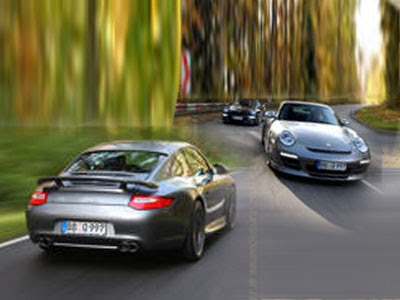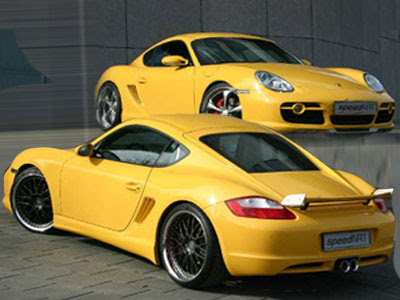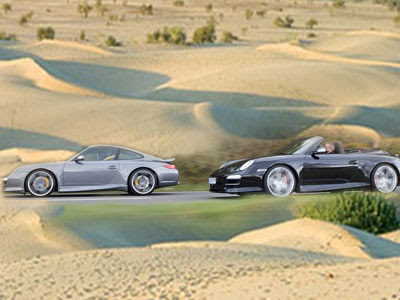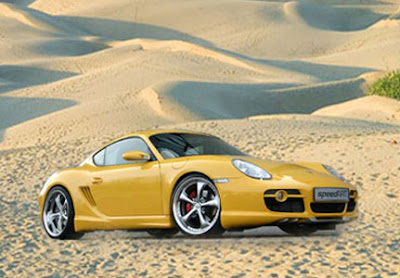SRS Aerokit SpeedART The Sports Car Porsche Cayman a Sporty and Elegant.
The SRS Aerokit from the German tuning firm SpeedART is a subtle and stylish way to spruce up the Porsche Cayman or Cayman S.
Unlike many bodykits which radically alter the appearance and persona of the car - sometimes for the good, but all to often for the bad - the SRS Aerokit is extremley in tune with the overall shape of the Cayman.The aerodynamic modifications include a 3-piece front chin spoiler - which provides additional downforce over the front axle, new deeper sideskirts, and an adjustable rear spoiler which has a distinct racing look to it. SpeedART have certainly taken the 'less is more' approach to design, and it's paid off.
The new Boxster and Cayman are significantly more fuel-efficient than their predecessors. The new 2.9-litre Boxer engine sips 8.9 litres of fuel per 100 kilometres (combined) – 11 per cent less than the former models with Tiptronic S. Reducing fuel consumption by 16 per cent to 9.2 litres/100 kilometres, the 3.4-litre versions with PDK offer an even greater saving.
For the first time, both models are available with a Lights Package featuring bi-xenon headlights, dynamic curve lights and LED daytime driving lights. Replacing the foglamps, these light units are made of four LEDs positioned next to one another on the Boxster, while on the Cayman four LEDs are arranged in round light units like the eyes of a dice.
PDK cars’ acceleration is even more dynamic with one of the optional Sports Chrono Packages featuring Launch Control for maximum acceleration from a standing start, while the Race Track Gearshift Strategy offers the fastest possible shifting on the track. With Launch Control, the respective models accelerate from a standstill to 100 km/h another 0.2 seconds faster. (For instance, the Cayman S with PDK and Launch Control accelerates to 100 km/h in 4.9 seconds, while the base Boxster with its new six-speed manual gearbox completes the same exercise in 5.9 seconds.)A new suspension set-up gives the new models a combination of even greater driving dynamics and enhanced comfort. Steering forces have been further reduced, giving the Boxster and Cayman even more agile and spontaneous steering behaviour.
The wheels come in new designs and are half an inch wider on the Boxster and Cayman than in the past in order to accommodate the larger brake system from the S models on the front axle. All Boxster and Cayman models feature the latest generation of Porsche Stability Management (PSM), with two additional functions: Brake Pre-Loading and Brake Assistant.
Whenever the driver lets go of the gas pedal very quickly – which is typical of an upcoming emergency braking manoeuvre – the PSM control unit builds up an appropriate level of pressure on the brakes before the driver even presses down the brake pedal, moving the brake pads slightly towards the discs, which significantly improves brake response and shortens stopping distances accordingly.
Unlike many bodykits which radically alter the appearance and persona of the car - sometimes for the good, but all to often for the bad - the SRS Aerokit is extremley in tune with the overall shape of the Cayman.The aerodynamic modifications include a 3-piece front chin spoiler - which provides additional downforce over the front axle, new deeper sideskirts, and an adjustable rear spoiler which has a distinct racing look to it. SpeedART have certainly taken the 'less is more' approach to design, and it's paid off.
A newly-enlarged 2.9-litre flat-six engine develops 255 bhp in the Boxster and 265 bhp in the Cayman, an increase of 10 and, respectively, 20 bhp over preceding models. The 3.4-litre power unit in the S versions, benefiting from Direct Fuel Injection, now delivers 310 bhp in the Boxster S and 320 bhp in the Cayman S, up by 15 and 25 bhp.

2009 SRS Aerokit SpeedART Porsche Cayman
The new Boxster and Cayman are significantly more fuel-efficient than their predecessors. The new 2.9-litre Boxer engine sips 8.9 litres of fuel per 100 kilometres (combined) – 11 per cent less than the former models with Tiptronic S. Reducing fuel consumption by 16 per cent to 9.2 litres/100 kilometres, the 3.4-litre versions with PDK offer an even greater saving.
For the first time, both models are available with a Lights Package featuring bi-xenon headlights, dynamic curve lights and LED daytime driving lights. Replacing the foglamps, these light units are made of four LEDs positioned next to one another on the Boxster, while on the Cayman four LEDs are arranged in round light units like the eyes of a dice.
The Boxster and Cayman are available for the first time with the seven-speed Porsche-Doppelkupplungsgetriebe, or PDK, which replaces the former Tiptronic S. Equipped with this double-clutch gearbox, the roadster and coupé accelerate to 100 km/h 0.1 seconds faster than with the six-speed manual fitted as standard on all models.

2009 SRS Aerokit SpeedART Porsche Cayman
PDK cars’ acceleration is even more dynamic with one of the optional Sports Chrono Packages featuring Launch Control for maximum acceleration from a standing start, while the Race Track Gearshift Strategy offers the fastest possible shifting on the track. With Launch Control, the respective models accelerate from a standstill to 100 km/h another 0.2 seconds faster. (For instance, the Cayman S with PDK and Launch Control accelerates to 100 km/h in 4.9 seconds, while the base Boxster with its new six-speed manual gearbox completes the same exercise in 5.9 seconds.)A new suspension set-up gives the new models a combination of even greater driving dynamics and enhanced comfort. Steering forces have been further reduced, giving the Boxster and Cayman even more agile and spontaneous steering behaviour.

2009 SRS Aerokit SpeedART Porsche Cayman
The wheels come in new designs and are half an inch wider on the Boxster and Cayman than in the past in order to accommodate the larger brake system from the S models on the front axle. All Boxster and Cayman models feature the latest generation of Porsche Stability Management (PSM), with two additional functions: Brake Pre-Loading and Brake Assistant.
Whenever the driver lets go of the gas pedal very quickly – which is typical of an upcoming emergency braking manoeuvre – the PSM control unit builds up an appropriate level of pressure on the brakes before the driver even presses down the brake pedal, moving the brake pads slightly towards the discs, which significantly improves brake response and shortens stopping distances accordingly.


No comments:
Post a Comment